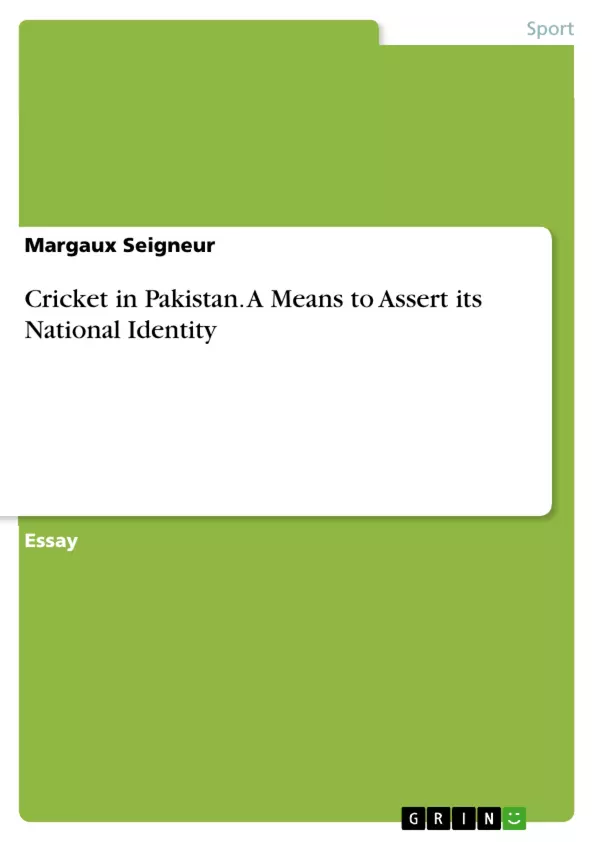This essay will employ the discipline of cricket in Pakistan as a lens of analysis to better understand the one-to-one correlation between sport and national identity. In the post-colonial scheme, the sentiment of nationalism has been strongly enhanced and influenced by the rehabilitation of the country’s sovereignty. Pakistan has historically been subject to intense vectors such as nationalism, imperialism, colonialism, decolonization etc. which has been reflected in the game of cricket.
Benedict Anderson’s conception of the nation relies on its imaginary character. A nation is imagined because the members of even the smallest nation will never know most of their fellow members, meet them, or even hear of them, yet in the minds of each lives the image of their communion. In the light of that statement, a nation is manufactured by cultural, political, and psychological factors in which the role of language as well as discourse has a predominant impact on its construction.
Indeed, Wodak, De Cillia, Reisigl and Liebhart shine a spotlight on the fact that uniqueness and distinctness of a community and its values are influenced by discourse. Since language and discourse appear as a key instrument in the social construction of an imagined community that one creates, new narratives can, thus, modify citizens’ perceptions of what constitutes their feeling of their national identity.
It will therefore be necessary to observe sport as a form of discourse and thus as a factor of national identification capable of counting its narrative to draw up the portrait of an answer to the following question: What role does sport play in forming and shaping national identity? Sports are linked to political socialization, formation of the political culture and development of national identity.
Inhaltsverzeichnis (Table of Contents)
- Cricket in Pakistan, a mean to assert national identity
- Cricket as a form of discourse and national identification
- Sport as a reflection of wider issues in society
- Cricket in Pakistan as a lens of analysis for national identity
- The post-colonial context and the role of sport
- Cricket as a mean of control, distraction, and resistance
- Cricket as an instrumental form of socialisation during colonialism
- Cricket as a mean of resistance asserting Pakistani identity
- Cricket as an integrated construction of Pakistani society and culture
- Cricket and the formation of national identity
- The impact of colonialism on national identity
- Cricket as a symbol of imperial solidarity and superiority
- Cricket as a tool for cultural homogenization and racial dominance
- The post-colonial reinvention of cricket
- Resistance to British cultural invasion and re-appropriation of cricket
- Cricket as a tool for asserting Pakistani identity
- The institutionalisation of cricket in Pakistan
- The rise of cricket in Pakistan after independence
- The role of transnational competitions in asserting national power
- The 1992 Cricket World Cup victory and its significance for Pakistan
- Cricket and the strengthening of national identity
- Cricket as a unifying force in Pakistani society
- The influence of cricket on Pakistani politics and diplomacy
- Cricket diplomacy and the rivalry between India and Pakistan
- Cricket as a tool for peace and reconciliation
- Conclusion
Zielsetzung und Themenschwerpunkte (Objectives and Key Themes)
This essay examines the role of cricket in shaping and asserting national identity in Pakistan, particularly in the context of its post-colonial history. The essay explores how cricket served as a tool for both British colonial control and Pakistani resistance, ultimately becoming a powerful symbol of national pride and unity. Here are some of the key themes explored:- The impact of colonialism on the formation of national identity
- The use of sport as a tool for social control and cultural homogenization
- The role of sport in resisting colonial dominance and asserting national identity
- The relationship between sport, politics, and diplomacy in post-colonial societies
- The significance of cricket as a unifying force in Pakistani society
Zusammenfassung der Kapitel (Chapter Summaries)
This essay begins by outlining the theoretical framework for understanding the relationship between sport and national identity, drawing on the work of Benedict Anderson and Ruth Wodak. It then delves into the historical context of cricket in Pakistan, examining its role in British colonialism and the subsequent process of decolonization. The essay explores how cricket was used as a tool for British domination and how it was re-appropriated by Pakistanis as a symbol of national resistance and independence. The essay then focuses on the institutionalization of cricket in Pakistan and the role it has played in shaping the country’s national identity. This includes discussing the rise of cricket in Pakistan following independence, the significance of the 1992 Cricket World Cup victory, and the use of cricket as a tool for diplomacy in relations with India.Schlüsselwörter (Keywords)
This essay focuses on the complex relationship between sport, national identity, and post-colonialism. It explores themes of colonialism, resistance, cultural homogenization, sport as a tool for social control, sport as a symbol of national pride, and the role of sport in diplomacy. Key concepts include the imagined community, discourse, national identity, cricket as a form of socialisation, post-colonial reinvention, and cricket diplomacy.- Quote paper
- Margaux Seigneur (Author), 2021, Cricket in Pakistan. A Means to Assert its National Identity, Munich, GRIN Verlag, https://www.grin.com/document/1014925



